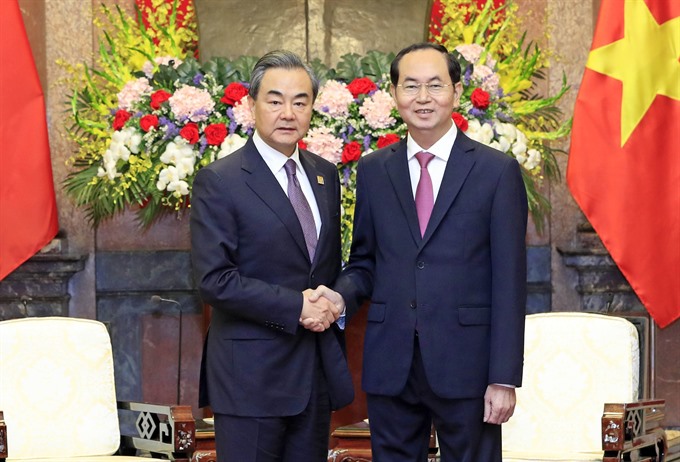 Politics & Law
Politics & Law

The Party, State and people of Việt Nam always stand ready to boost the comprehensive strategic cooperative partnership with the Party, State and people of China, President Trần Đại Quang told State Councilor and Foreign Minister of China Wang Yi during a reception in Hà Nội on April 1.
 |
| President Trần Đại Quang (right) received State Councilor and Foreign Minister of China Wang Yi on his official visit to Việt Nam. — VNA/VNS Nhan Sáng |
HÀ NỘI — The Party, State and people of Việt Nam always stand ready to boost the comprehensive strategic cooperative partnership with the Party, State and people of China, President Trần Đại Quang told State Councilor and Foreign Minister of China Wang Yi during a reception in Hà Nội on April 1.
The Vietnamese President congratulated
He asked to strengthen political trust and maintain regular exchanges among high-ranking leaders and step up exchanges between the two countries’ ministries, agencies, localities, businesses and people.
The host said both sides need to direct departments and agencies to fully implement the two nations’ agreements, promote trade and investment ties and facilitate exchanges to raise mutual understanding between people of all walks of life.
The President suggested ministries, agencies and localities enhance economic connectivity and push forward balanced and sustainable two-way trade, and improve the efficiency of mutually beneficial co-ordination to bring practical benefits to the two peoples.
He requested settling issues at sea in the spirit of respect for each other’s legitimate interests and international law, adding that both sides need to uphold the agreement on basic principles guiding the settlement of issues at sea in order to peacefully address maritime disputes.
The two countries need to soundly manage disputes and prevent actions that further complicate the situation, contributing to peace and stability in the
Wang, who is in Việt
He said
PM’s reception
Receiving the Chinese official on March 31, Vietnamese Prime Minister Nguyễn Xuân Phúc said Wang’s visit demonstrated
On the occasion, PM Phúc urged both sides to continue resolving shortcomings in the economic, trade and investment ties which have grown quite rapidly but co-operation has still not reached its potential.
“Both sides need to actively exchange and take measures to promote bilateral trade in an equal and sustainable way. Of note,
He also called for accelerated implementation of co-operation projects in transportation, agriculture, environment, science and technology, and finance; and effective implementation of
Wang affirmed that the Chinese Party, Government and people attach much importance to and stay ready to promote the comprehensive, friendly and co-operative neighbourhood relationships between China and Việt Nam; seizing opportunities to strengthen co-operation on the basis of mutual benefits in fields; controlling situations well and adequately dealing with any disputes to maintain peace and stability in the East Sea, also known as the South China Sea. — VNS




